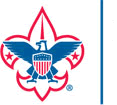Outing Responsibilities
The following section is intended for your parent(s)/ or guardian(s):
Troop Outings, including camping and outdoor activities, are the heart of BSA Scouting.
There are dangers on outings – fires, stoves, knives, sticks, insects, animals, streams, weather, falls, other Scouts – but while adults accompany the Scouts on outings, the adult leaders’ role is to assure the safe guidance of the outing experience without smothering the Scouts. Scouts will make mistakes and may not always be happy, but the Scouts are there to develop and learn, and part of that experience is learning from those mistakes.
In general, we encourage Scouts to camp with their patrol in a patrol site separate from the other patrols. Patrols plan their own menus, and cook and eat together as a team. Adults do not eat or camp with a Scout patrol.
Adults do not interfere with the functioning of boy leaders, even if they make mistakes, unless it is a matter of safety or if the mistake will be immediately costly.
Adults do not usually do anything for a boy that he can do himself. They let him make decisions without adult interference, and let him make non-costly mistakes. Boy Scout camping activities center on the patrol, where scouts learn teamwork, leadership, and most camping skills. It is important that adults not be in the middle of patrol activities such as site selection, tent pitching, meal preparation, and anything else where scouts get to practice decision-making.
The responsible person for a Scout patrol is the boy Patrol Leader. This isn’t token leadership. A Patrol Leader has real authority and genuine responsibilities. Much of the success, safety, and happiness of the other boys depends directly on him.
Scouting teaches leadership. And scouts mainly learn leadership by practicing it, not by watching adults lead.
While Scout skills are an important part of the Scout program, what ultimately matters when our Scouts become adults is not whether they can use a map & compass, but whether they can offer leadership to others in tough situations; and can live by a code that centers on honest, honorable, and ethical behavior.
At all outings there will be trained adult leaders, and sometimes partly-trained and untrained parents/guardians. So what do we adults do, now that we’ve surrendered so much direct authority to boys?
Adults always tent separately from boys, and generally cook and eat separately from the Scouts. We will be safely nearby, but not smotheringly close.
We do that by ensuring adequately trained adults are present at the outing, (including training in basic first aid) and by following the BSA Guide to Safe Scouting. Among other things it requires a minimum of 4 people on any outing, 2-deep adult leadership (i.e. no boy will be alone with a single adult) and an enforced Scout buddy system (i.e. outside the campground boys must always have a buddy along with them). When swimming is involved, a BSA-trained life-guard will be present.
Parents/Guardians
As parents or guardians, you have as great a role, or even greater, in the success of your Scout as the Troop’s adult and scout leaders. Scouts is a program for youth to gain experience in many different walks of life, learn self reliance, and learn to become leaders or team-players as appropriate. Scout outings are not cheap daycare. The following is a list of responsibilities that you can contribute to help your Scout enjoy and develop from successful Scout Outings:
Please help your Scout understand the meaning of the Scout Law – A Scout is trustworthy, loyal, helpful, friendly, courteous, kind, obedient, cheerful, thrifty, brave, clean, and reverent. On an Outing, it is important that the Scout knows how to behave and participate properly with respect for other Scouts and their leaders.
Please try to include in your home an environment where these Boy Scout principles are already lived so Outings will be no different.
Please take time to learn about the Scout program yourself – read your scout’s books and understand his goals and desires in terms of rank advancement and merit badges.
Please equip your Scout appropriately, within your budget. Many of our young Scouts weigh less than 70 lbs so should not be carrying more than 20 lbs on an Outing – a target of 15 lbs is achievable even for those on a tight budget.
The Troop operates an equipment exchange program, so there may be used equipment available for your Scout. It is unfair to your Scout, and potentially unsafe to overload him. It is also unfair to other Scouts and adult leaders who often have to share the load of an overloaded Scout. Click here for advice if you are unsure what is appropriate and not.
Please ensure that Scout leaders know of any medical conditions that your Scout has, and provide any necessary medications and dosage instructions.
Please do not send your Scout on an Outing if he is unwell
Please ask the adult leaders if there is any way you can help – there may be vacant leadership positions you would be willing to fill, or just incidental assistance that you may be able to offer
If you don’t agree with an adult leader, then, unless they are putting a boy or group in danger, please privately discuss your other options with them, but ultimately let them do their job and make the decision.


